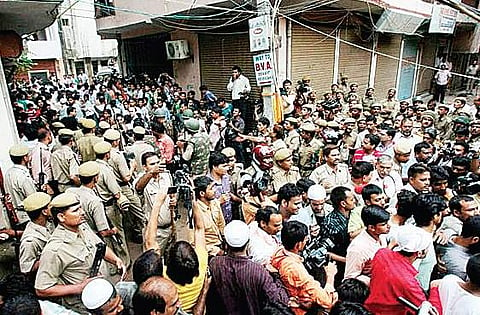

It’s the unprompted, random remarks that reveal the most about how we see the world. On a recent visit to Ahmedabad, my taxi wound through the unfamiliar city, passing neighbourhoods and markets, the windows framing clutches of people as they went about their business. As I tried to get a sense of it all, the driver gestured outside and remarked, “Yeh toh mini-Pakistan hai”.
That’s all it takes to mark a space, a people, a practice as ‘Other’. As ‘Not Us’. Whatever the imagined composition of ‘Us’ may be.In a work that is part memoir, part socio-political commentary, Neyaz Farooquee writes about becoming and being this Other, the shift from an understanding of oneself as a ‘Normal Human Being’ to one that is marked in ways not entirely comprehensible. An Ordinary Man’s Guide to Radicalism: Growing up Muslim in India takes us into the intimate spaces of the journey from innocence to understanding.
In September 2008, a residential building in Delhi’s Jamia Nagar was raided and two young men and a police officer died in the ensuing face-off. The incident came to be known as the ‘Batla House Encounter’ and sparked off a fierce debate around profiling and targeting on the basis of religion. Over the next few weeks, several students came under suspicion for being involved with the radical group, and were taken in for questioning, provoking protests by civil rights activists.
Farooquee, then a student at Jamia Millia Islamia University, lived a stone’s throw from the building where the encounter had taken place, and many of his friends lived in and around the location. Overnight, a sort of paranoia took hold, with the realisation that each one of them could be seen as possible suspects.
Lost mobile phones, random conversations with friends, loitering at now-dubious spots… anything could be seen as incriminating. Jamia Nagar was in any case seen as a Muslim ghetto, a place occupied by those with questionable sympathies. He writes: “Jamia Nagar creates a jumble of names, faces and identities, and possibly faulty memories. That memory could be yours, or someone else’s, and if that someone else is, let’s say, a Terror Suspect disguised as a Normal Human Being, you have no idea how his memory is going to behave. It was an alarming thought and it made everyone untrustworthy. Friends, close friends, acquaintances, strangers, everyone.”
But this is getting ahead of the story, which begins in a small village in Bihar’s Gopalgunj district, and a close-knit family with big dreams for the oldest grandchild. Farooquee describes in close and revealing detail his early years in the village, his relationship with his Dada, the train journey to the nation’s capital and the difficult process of making a home in a small and crowded corner of the big city.
Struggling with a new language, unfamiliar food, with the absence of a nurturing family, Farooquee’s experience will probably resonate with the millions of young people who leave their rural homes seeking education and what they hope is a better life. And in the process, they discover themselves and their ‘place’ in society.
The book is, essentially, a story about identity—the uncomplicated nurturing of it as a cultural fact, and the strategic positioning of it as a political reality. Farooquee writes without sentimentality, offering important insights into the incidental and systemic processes that create alienation and difference.
An Ordinary Man’s Guide to Radicalism
By: Neyaz Farooquee
Publisher: Westland
Pages: 280; Price: Rs 499